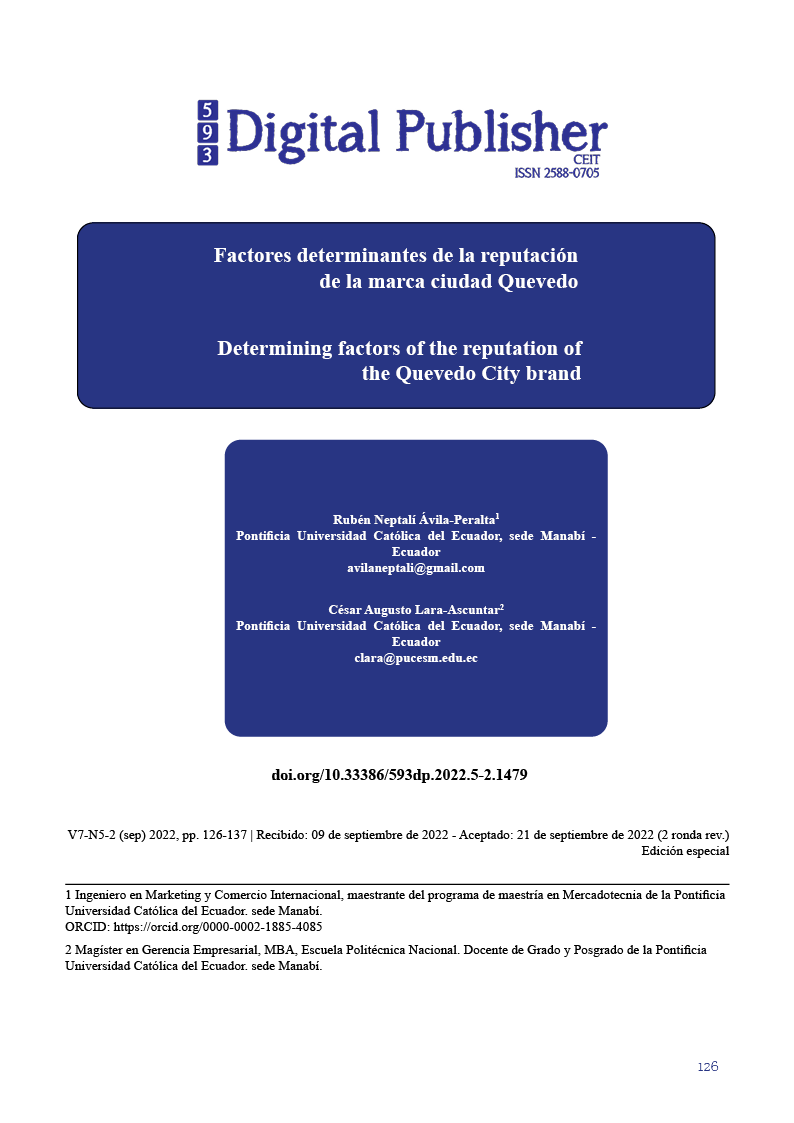Determining factors of the reputation of the city brand Quevedo.
Main Article Content
Abstract
Faced with the need to build their own identity, cities seek to be recognized as brands by promoting their assets, which determine their positioning and reputation. Through this study, the main factors that influence the reputation of the city brand "Quevedo" are determined. The research approach is quantitative with a descriptive exploratory level. The data collection technique used was the survey with questions addressed to the citizens of Quevedo where they indicate the importance of each of the determining factors of the city's reputation and the satisfaction with each of them. The main findings are that the reputation of the "Quevedo" brand has been negatively affected by insecurity in recent years and has had a negative economic and political impact. It was also identified that the main assets of the city are tourism, talent, business activity and infrastructure. Security is the factor with the highest rate of dissatisfaction followed by public administration. The research hypothesis is verified and it is determined that the high rates of insecurity in Quevedo have negatively affected the reputation of the city. To improve the city's reputation, the integration of internal managers involved in territorial identity is required.
Keywords: territorial identity, city brand, reputation, security.
Downloads
Article Details

This work is licensed under a Creative Commons Attribution-NonCommercial-ShareAlike 4.0 International License.
1. Derechos de autor
Las obras que se publican en 593 Digital Publisher CEIT están sujetas a los siguientes términos:
1.1. 593 Digital Publisher CEIT, conserva los derechos patrimoniales (copyright) de las obras publicadas, favorece y permite la reutilización de las mismas bajo la licencia Licencia Creative Commons 4.0 de Reconocimiento-NoComercial-CompartirIgual 4.0, por lo cual se pueden copiar, usar, difundir, transmitir y exponer públicamente, siempre que:
1.1.a. Se cite la autoría y fuente original de su publicación (revista, editorial, URL).
1.1.b. No se usen para fines comerciales u onerosos.
1.1.c. Se mencione la existencia y especificaciones de esta licencia de uso.
References
Belmonte, A. (2020). La Importancia de la “Marca.” In Pymes Coaching. www.pymecoaching.com
Berrozpe Martínez, A. (2015). La identificación con la marca: conceptualización, caracterización y consecuencias. Opción, 31(2), 144–161.
Bonaiuto, M., Ariccio, S., de Dominicis, S., Fornara, F., Molinario, E., Troffa, R., & Wang, H. (2018). City Reputation Indicators (CRIs): measuring inhabitants’ city representation / Indicadores de Reputación Urbana: midiendo la representación de una ciudad en sus habitantes. PsyEcology, 10(1), 31–87. https://doi.org/10.1080/21711976.2018.1545348
Forero, J. D. (2014). El sector del calzado en el barrio El Restrepo, Bogotá. Un análisis de caso a la luz de los sistemas productivos locales. Equidad y Desarrollo, 1(21), 97–123. https://doi.org/10.19052/ed.2349
Godoy Zúñiga, M. E., y Vásquez Haro, C. (2018). Análisis de la marca ciudad como fortalecimiento de la imagen del cantón Portoviejo - Dialnet. DELOS: Desarrollo Local Sostenible, 11(32), 75–92. https://bit.ly/3bHl65j
Hernandéz, R., Fernández, C., y Baptista, P. (2010). Metodología de la Investigación. México: Mc Graw Hill Educación.
Jordá, A. (2016). La Marca-Ciudad - Dialnet. https://dialnet.puce.elogim.com/servlet/articulo?codigo=5569651
Lam, S. K., Ahearne, M., Hu, Y., y Schillewaert, N. (2010). Resistance to Brand Switching when a Radically New Brand is Introduced: A Social Identity Theory Perspective: SAGE Journals, 74(6), 128–146. https://doi.org/10.1509/JMKG.74.6.128
Lluis Ribechini, G. (2014). El futuro de las ciudades se definirá por cómo gestionan sus Activos Intangibles. | Innogeniero. https://bit.ly/3JJufqz
Moreno, J., y Navarro, J. (2020). Factores determinantes de la reputación gubernamental: una ponderación a través del algoritmo de Saaty. Ciencia Ergo-Sum, 27(1), 1–15. https://doi.org/10.30878/ces.v27n1a3
Morillo, C., y García, A. (2019). La marca ciudad como factor de creación de valor. EAE Business School, 1–27. https://bit.ly/3Qk8WOI
Piña, J., y Cuevas, Y. (2004). La teoría de las representaciones sociales: Su uso en la investigación educativa en México. Perfiles Educativos, 26(105), 60–75. https://bit.ly/3dnoPp5.
Rateau, P., y lo Monaco, G. (2013). La Teoría de las Representaciones Sociales: Orientaciones conceptuales, campos de aplicaciones y métodos. CES Psicología, 6(1), 22–42.
Sordo, A. I. (2020). Posicionamiento de marca: qué es, cómo crearlo y ejemplos. HubSpot. https://blog.hubspot.es/marketing/posicionamiento-marca
Torres, M., González, Y., y Manzano, O. (2020). City branding as an urban competitiveness strategy in intermediate cities Title in English. Revista Espacios, 41(36), 171–185. https://www.revistaespacios.com
Valenzuela Robles, M. E. (2015). La estrategia de marca-ciudad en la función de turismo. El Periplo Sustentable, 1(28), 59–80. https://bit.ly/3zNfYo5
Villarroel, M., Carranza, W., y Cárdenas, M. (2017). La creación de la marca y su incidencia en el posicionamiento de un producto. Revista Publicando, 2(12), 684–697.



